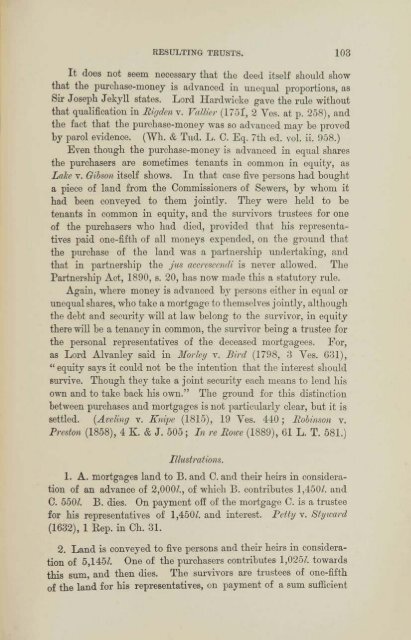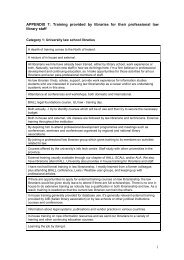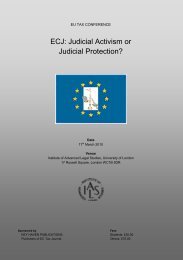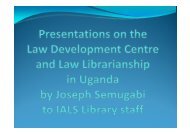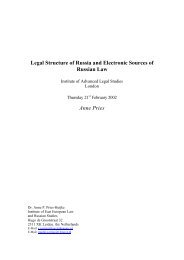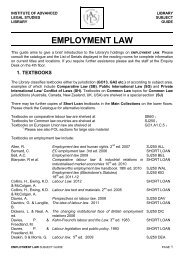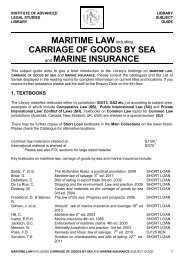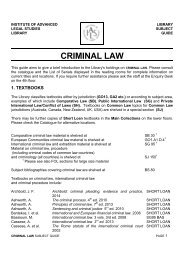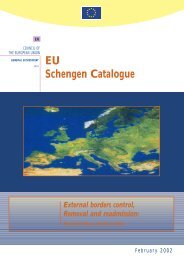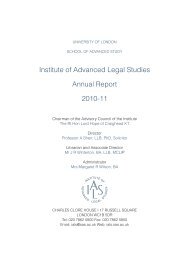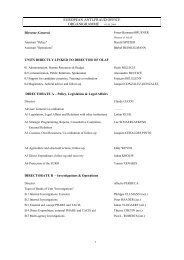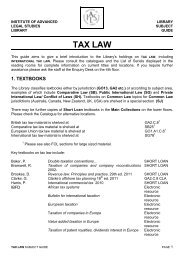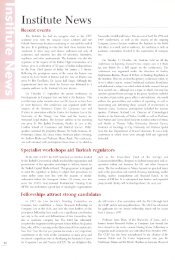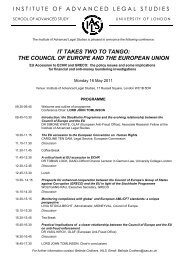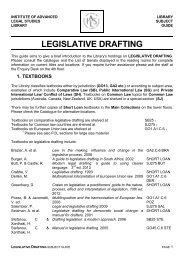a thesis - Institute of Advanced Legal Studies
a thesis - Institute of Advanced Legal Studies
a thesis - Institute of Advanced Legal Studies
You also want an ePaper? Increase the reach of your titles
YUMPU automatically turns print PDFs into web optimized ePapers that Google loves.
RESULTING TRUSTS. 103<br />
It does not seem necessary that the deed itself should show<br />
that the purchase-money is advanced in unequal proportions, as<br />
Sir Joseph Jekyll states. Lord Hardwicke gave the rule without<br />
that qualification in Rigden v. Vallier (1751, 2 Yes. at p. 258), and<br />
the fact that the purchase-money was so advanced may be proved<br />
by parol evidence. (Wh. & Tud. L. C. Eq. 7th ed. vol. ii. 958.)<br />
Even though the purchase-money is advanced in equal shares<br />
the purchasers are sometimes tenants in common in equity, as<br />
Lake v. Gibson itself shows. In that case five persons had bought<br />
a piece <strong>of</strong> land from the Commissioners <strong>of</strong> Sewers, by whom it<br />
had been conveyed to them jointly. They were held to be<br />
tenants in common in equity, and the survivors trustees for one<br />
<strong>of</strong> the purchasers who had died, provided that his representatives<br />
paid one-fifth <strong>of</strong> all moneys expended, on the ground that<br />
the purchase <strong>of</strong> the land was a partnership undertaking, and<br />
that in partnership the jits accrcsccndi is never allowed. The<br />
Partnership Act, 1890, s. 20, has now made this a statutory rule.<br />
Again, where money is advanced by persons either in equal or<br />
unequal shares, who take a mortgage to themselves jointly, although<br />
the debt and security will at law belong to the survivor, in equity<br />
there will be a tenancy in common, the survivor being a trustee for<br />
the personal representatives <strong>of</strong> the deceased mortgagees. For,<br />
as Lord Alvanley said in Morlcy v. Bird (1798, 3 Yes. 631),<br />
" equity says it could not be the intention that the interest should<br />
survive. Though they take a joint security each means to lend his<br />
own and to take back his own." The ground for this distinction<br />
between purchases and mortgages is not particularly clear, but it is<br />
settled. (Aveling v. Knipe (1815), 19 Yes. 440; Robinson v.<br />
Preston (1858), 4 K. & J. 505; In re Rowe (1889), 61 L. T. 581.)<br />
Illustrations.<br />
1. A. mortgages land to B. and C. and their heirs in consideration<br />
<strong>of</strong> an advance <strong>of</strong> 2,000/., <strong>of</strong> which B. contributes 1,450/. and<br />
C. 550/. B. dies. On payment <strong>of</strong>f <strong>of</strong> the mortgage C. is a trustee<br />
for his representatives <strong>of</strong> 1,450^. and interest. Petty v. Sty ward<br />
(1632), 1 Rep. in Ch. 31.<br />
2. Land is conveyed to five persons and their heirs in consideration<br />
<strong>of</strong> 5,145/. One <strong>of</strong> the purchasers contributes 1,025/. towards<br />
this sum, and then dies. The survivors are trustees <strong>of</strong> one-fifth<br />
<strong>of</strong> the land for his representatives, on payment <strong>of</strong> a sum sufficient


